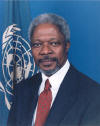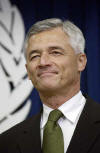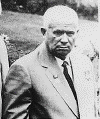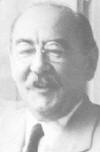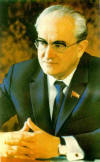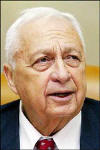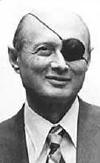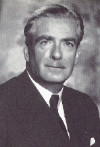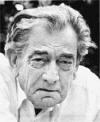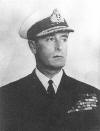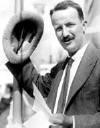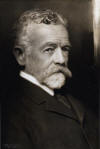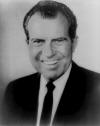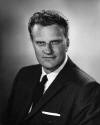| May 2004 | |||||||||||||||||||||||||||||||
|
|
European American Evangelistic Crusades |
||||||||||||||||||||||||||||||
|
The Flaming Sword |
|||||||||||||||||||||||||||||||
|
TRAIL OF BLOOD AND MURDER - Part VII John S. Torell |
|||||||||||||||||||||||||||||||
As events are developing in 2004, it becomes more and more evident that the current events in Iraq and the election campaign now raging in the United States are a repeat of events that took place some 50 years ago. The issues are the same, just new players with different names, but with the same ideology as the players of the 1950’s. Dag Hammarskjold was a powerful international player that stood in the way of the policies of Israel. Since he could not be subdued and controlled, he was assassinated. The current Secretary General of the United Nations is Kofi Atta Annan who was born in Ghana, Africa in 1938. He is the seventh Secretary General of the United Nations, one who is not bowing to the wishes of the Israeli leadership. The question is, how long will he live on this earth?
That this thought is not a far fetched idea can be seen in the recent assassination of the United Nations’ diplomat Sergio Vieira de Mello (born 1948 in Brazil). Sergio served in the United Nations for more than 30 years and was appointed UN high commissioner of human rights in 2002. He studied at the University of Paris (Sorbonne), France and received a degree in philosophy in 1969 and a Ph.D. in 1974. Sergio served as a UN official in Bangladesh, Cyprus, Mozambique, Lima, Peru, Lebanon, Bosnia and Herzegovina and East Timor. His character was similar to Dag Hammarskjold and he had become a very seasoned UN diplomat, knowing all the ins and outs of politics as being played by world leaders, including international Jewish leaders. It was believed at the United Nations that Sergio would become Secretary General of the UN once Kofi Annan’s term was up. In 2003 Sergio became the director of the UN mission to Iraq, and was stationed in Baghdad as the personal representative for Kofi Annan. His orders were to stay in Iraq for four months and then return to his regular assignment as high commissioner. At this time the UN had a total of 646 people working in Iraq, with 300 working in the UN headquarters in Baghdad. With a strong UN force in place, Sergio was working hard to prepare Iraq for elections and for the return of power from the United States as an occupier to a new Iraqi regime. Being a seasoned diplomat, Sergio and his team were making great progress and thus became a threat, not only to the Saddam "diehards" and the fanatic Shiite Muslim leaders, but also to Israel which does not want to have a unified strong Iraq, but a fragmented nation, rife with civil strife between the Sunnis, Kurds and Shiites. Who directed the assassination is not known, but on August 19, 2003 "terrorists" drove a large truck with explosives and detonated it on the side of the UN compound where Sergio had his personal office. Fourteen other UN officials were killed, and dozens injured. As a result Kofi Annan ordered all UN personnel out of Iraq and thus a quick return to Iraqi rule was lost. 1Since I started out this series of A Trail Of Blood And Murder, it has become apparent to me, that in order to understand what is happening in 2004, I must lay a strong foundation of historic fact to give the reader a chance to grasp and understand current political and military events. So, bear with me as we journey through history. We will now pick up the story where we left it with the March 2004 Newsletter. BACK TO 1956 Dag Hammarskjold was forced to the sideline as head of the United Nations. All he could do at this point was to watch the "chess game" as it was played out by different national leaders from Israel, England, France and the Soviet Union. Egypt and Hungary were "laid out on the butcher’s block," to be cut and carved out. The United States was tied up by the American Jewish lobby, which put immense pressure on President Eisenhower.
HUNGARY The Communist leaders in the Soviet Union knew that they would have six days to prepare the slaughter of the Hungarian freedom fighters. They wanted to time the attack to coincide with the British/French invasion of Egypt. That would tie the United States down and make it helpless. Nikita Khrushchev, who was the Soviet strongman at this time and his "side-kick" Nikolay Bulganin played a game of "chicken" with President Eisenhower. Both sides knew that they could not fight a war against each other, both in Eastern Europe and in the Middle East at the same time. If American troops entered into Hungary to help the freedom fighters, it would have meant nuclear war, and the same would hold true if the Soviet Union had sent troops to Egypt. However, the Soviets threatened to send help to Egypt and this caused great concern for the American administration, with the result that the U.S. government "LET THE SOVIET GOVERNMENT UNDERSTAND, THAT THE U.S. WOULD NOT INTERVENE IN HUNGARY! This was a great betrayal, since it was the American CIA who had enlisted, trained and told the Hungarian freedom fighters to revolt against the Soviets.
By Wednesday October 31, the freedom fighters had taken over Hungary and the fighting had stopped. Hungarian Army units had switched sides to join the Freedom fighters. Imre Nagy (1896-1958) the Hungarian prime minister had abolished one party rule and demanded that Soviet troops withdraw from Hungary. Soviet tanks began to withdraw from Budapest, the capital of Hungary and for the moment it looked like the Hungarians had won their freedom. Imre Nagy now proclaimed his intention to take Hungary out of the Warsaw Pact. 2 The Hungarian Army leadership released the Roman Catholic Cardinal, Josef Mindszenty, who at that time was 64 years old and had been put in prison by the Soviets in 1949 for what they called "anti-Soviet activities." The Hungarian people were jubilant, and did not know that the ruthless Soviet ambassador to Hungary, Yuri Andropov (1914-1984), who later became the head of the dreaded KGB, was planning a crushing blow to the Hungarian uprising.
THE EGYPTIAN FRONT
The Mitla Pass was defended by two Egyptian battalions and an Egyptian armored brigade operating 15 miles north of the Mitla Pass. As soon as Sharon had connected with the 1st battalion, he requested permission from the Israeli army command center to move toward the Mitla Pass and take it. His request was denied. He then asked for permission to send a reconnaissance unit toward the pass and this was granted. Sharon disobeyed orders, instead moving a large force toward the pass and by midday the Israeli paratroopers entered the pass which is very narrow with steep canyon walls. A three mile section of the pass was only 150 feet wide. The Egyptian forces were dug in at this section and when the Israelis entered, they were fiercely resisted. So many vehicles were destroyed that all radio contact with Sharon was lost. A runner was dispatched and Sharon then sent two reinforced companies to flush out the Egyptians. It took the Israelis two and a half hours of heavy hand-to-hand combat to kill or capture the Egyptian soldiers. A number of Israeli vehicles were destroyed and 38 Israeli soldiers were killed with 120 wounded. The Egyptians lost 150 soldiers, some of them killed after they had been captured.
The Israeli Army Chief of Staff Moshe Dayan (1915-1981) was not only leading a military campaign, he also had to make political decisions. He was told by the Israeli prime minister that England and France might back out at the last moment and therefore Dayan could not commit any tank units in the attack on Egypt, until it was clear if the English/French invasion would take place. If England and France decided not to attack Egypt, then Israel would be in a very bad position politically. If no tanks were committed, Israel could lie and say that it was only "mopping up" Egyptian terrorists and then quickly withdraw its forces. The attack on Egypt was a three pronged attack. In the south racing toward Sharm el-Sheikh was the 9th Mechanized Brigade under the command of Colonel Avraham Yoffe. Their drive toward the southern tip of Sinai was very hard since there was no road in place on this side of Sinai. The attack to the north of the Sinai desert was led by Colonel Yehudah Wallach and consisted of the 4th and 10th Infantry Brigades and the 7th Armored Brigade. The Israeli force met fierce resistance from the Egyptian Army, and the overall commander of the Sinai forces, Brigadier General Assaf Simhoni, disregarded the order from General Dayan and ordered the 7th Armored Brigade into the battle at once. Dayan became extremely upset that he did not have control over his field commanders, but once the war had started there was nothing he could do about it. Egyptian forces resisted heavily and the Israelis were stalled by Wednesday evening. JERUSALEM By three o’clock in the afternoon there were still no bombing, and Gurion got involved in a heated debate with his chief of staff. Gurion ordered that all Israeli troops withdraw from the Sinai Peninsula. Dayan refused to obey the order, and a compromise was struck: Israeli troops would stop advancing further into Egypt and only fight if they were attacked. Israeli army units would not go on the attack until bombing had begun by the British and the French. LONDON AND PARIS It was not until 7 p.m. Cairo time, 25 hours after the ultimatum had been delivered, that the bombing of Egypt began. For the next two days, 200 Canberras, Venoms and Valiants and 40 French Thunderstreaks bombed economic targets in Egypt and wiped out much of the Egyptian Air Force on the ground.
THE BRITISH PARLIAMENT
As the day wore on, members of the house continued to press Eden and his foreign minister, Selwyn Lloyd (1904-1978). Finally the question was asked by Gaitskell, "Was there any secret agreement between Britain, France and Israel?" Without hesitation, Lloyd lied publicly on the floor at the House of Commons, when he stated, "There was no prior agreement between us about it." At 10:29 p.m. Lloyd officially announced to the Parliament that bombing had commenced against Egypt. A great commotion broke out and the House session was closed in disarray.
Anthony Eden received some more bad news during the day, his protégé, Anthony Nutting, a high official in the British Foreign Office resigned in protest of Eden’s policies in the Middle East. It is very interesting that both Eden and Lloyd denied their secret agreement with Israel until their deaths. The full truth was revealed in 1967, when Anthony Nutting went public and told the whole story. However, the British Government kept denying it. Lord Mountbatten, First Sea Lord of the Admiralty and in charge of the British forces during the Suez crisis , recorded an interview with BBC which was to air after his death. When he died in 1979 the British Government ordered that the interview would not be aired to the public. Lord Mountbatten had been a strong voice of dissent during the entire time, leading up to the invasion of Egypt. Whatever he said was damaging to the governments of England, France and Israel.
CURTAIN FALLS IN SYRIA
The British plans did not fully line up with American policies. The two Dulles brothers were working on a plan to take out Nasser and replace him with the Royal Saudi family and thus they did not support the SIS plan for Saudi Arabia. The Dulles brothers had no love for Syria, thus the SIS and the CIA started planning to overthrow the Syrian government. At this time, Iraq had a pro-British government so the British intelligence services operated freely in Iraq. The Syrian Government had been working with Russia and Czechoslovakia to build a huge refinery in Syria. This was not acceptable to the Western powers. There were two powerful American oil companies operating in Iraq, Standard Oil of New Jersey (Exxon) and Mobil, which were part owners of Iraq Petroleum Company. The Dulles brothers, who were setting the policies for President Eisenhower, had a problem; the U.S. Congress was not interested in aid to any Arab country. The Dulles brothers then came up with a solution, Congress would be bypassed and money would be used from a secret CIA fund to put in a bid to build the refinery in Syria. By secretly funding the bid from the American Oil Companies, the Communists would be undercut. Bill Eveland came to Washington D.C. on July 20, 1956 and had a meeting with Herbert Hoover,Jr., Undersecretary of State and Allen Dulles, where he was informed about the scheme for the refinery. On his way back to Beirut, Syria, he stopped in London and again met with George Young. The British intelligence officer complained that the U.S. was not moving fast enough on Syria. Eveland then flew on to Beirut, where he met on July 23 with the CIA director for the Middle East, Kermit Roosevelt, the latter working to set up the new American policies. Eveland was then told that the CIA had selected Mikhail Ilyan, a Syrian and the leader of the National Party and a former foreign minister of Syria, to become the new leader of Syria as soon as a coup could be staged. Ilyan was a rich landowner and well connected within, political circles in Syria. He was not a Muslim, but a Christian and thus more benevolent toward Israel. But on Wednesday, October 31, 1956, a very angry Mikhail Ilyan confronted Bill Eveland in Beirut and declared:
The curtain of the SIS/CIA plot for Syria was closed and the intelligence agents had to leave "with egg on their faces." Exxon and Mobil had to take a back seat to the State of Israel. WASHINGTON D.C.
The United States introduced a resolution in the Security Council of the UN for the withdrawal of Israeli forces from Egypt and the end of hostilities from England and France toward Egypt. According to his staff, President Eisenhower’s mood improved after he was informed that Dag Hammarskjold had handed a note to the United States’ permanent representative to the United Nations, Henry Cabot Lodge (1902-1985). Here is what Hammarskjold wrote:
The ambassador from Colombia had told Lodge that 21 Latin American countries were behind the President as never before. Support had been received from diplomats in Africa, Asia, Europe and Canada. Even the Soviet Union had lined up with the United States. But the Jewish Lobby in Washington D.C. was not pleased with Eisenhower and the pressure was applied hard for the president to back off and give Israel support in its war with Egypt.
The vice president at this time was Richard Nixon (1913-1994) and he was not a friend of the State of Israel. The administration staff considered Nixon to be a "hothead," who had to be controlled. Nixon had called Secretary of State John Foster Dulles during the day and said that he wanted to use the Suez crisis as a campaign issue during the last days of the presidential campaign. Dulles told Nixon to be moderate, but Nixon objected to this. Instead he said this:
Wednesday was a very busy day at the White House. Eisenhower had decided to cancel any further campaigning for his re-election bid and would instead address the nation. The following information will show us again that an American president is not really in charge, but it is his handlers who are setting the policies. John Foster Dulles was in charge of the speech, and the professional speech writer, Emmet Hughes, was the editor. At 3:15 p.m. Hughes was given the draft written by Dulles, but it was too rambling to be used. Eisenhower ordered a new speech, with the telecast scheduled for 7:00 p.m. Dulles and Hughes met in the Cabinet room, while Eisenhower was outside playing golf. As Hughes was re-writing the speech, Dulles was reading it page by page, and a number of changes were made. Forty five minutes before air time, Hughes went to the president’s bedroom to show him the final draft of the speech. Eisenhower read it aloud while he was dressing and said that he liked the speech. His comment to Hughes was this: "I want to be sure we show clearly in here how vital we think our alliances are. Those British – they’re still my right arm." Fifteen minutes before Eisenhower was going to speak to the American people, he arrived at the Oval Office. During this time Hughes was underlining with grease pencil the parts of the speech which the president was to emphasize, handing the president one page at a time. Four minutes before seven, Eisenhower received the last page and made this remark: "Boy, this is taking it right off the stove, isn’t it?" Eisenhower was a good actor, and he spoke with a strong voice, being confident, and his face calm and serious. He told the American people that he had not been "consulted in any way about any phase of the Anglo-French-Israeli attacks," and that he thought them in error. "To say this is in no way to minimize our friendship with these nations, nor our determination to maintain those friendships. We are fully aware of the grave anxieties of Israel, of Britain and France. We know that they have been subjected to grave and repeated provocations. Nonetheless, the United Nations represents the soundest hope for peace in the world." What the president said in reality was, that as the American president he had been kept in the dark and had no clue as to what was happening in the Middle East. Once he found out, he was not happy, but nevertheless the U.S. would back the three nations who had attacked Egypt. It was a blatant lie that Egypt had provoked the three nations to attack. Eisenhower also mentioned Hungary in his speech. He praised the Soviets for their withdrawal of tanks from Budapest and assured the Communists that the U.S. had no interest in pulling Hungary into NATO. Thus the American president sealed the fate of the Hungarian people by letting the Communists know that regardless what the Soviets did in Hungary, the U.S. would not intervene.
RICHARD NIXON AND BILLY GRAHAM During their private conversation in the Oval Office Billy Graham expressed disdain for what he saw as Jewish domination of the media in the United States. In Graham’s own words:
At a later point in their conversation Nixon raises the subject of Jewish influence in Hollywood and to this Graham responds:
The American (Jewish) media later picked up this story. Comments like this from the well known world evangelist were extremely damaging to the Jewish leadership so pressure was applied to Graham. On Friday, March 1, 2002 Billy Graham issued a press release, which stated the following:
When this press release was made public, Billy Graham was 83 years old and in bad health, battling Parkinson’s disease. Whether the press release came from Billy Graham or from his "handlers" is up to each reader to judge. The facts remain, Billy Graham spoke forcefully about the Jews in 1972, but in 2002 he cannot remember even having said this. This incident again shows the power of the American Jewish leadership and that even powerful politicians and religious leaders will bow to their demands. THURSDAY, NOVEMBER 1, 1956 Labor leader, Aneurin Bevan (1897-1960), gave an intense speech in which he strongly chastised Eden and his party for attacking Egypt and lining up with France and Israel. As Egypt at this time stood alone, he reminded them that England had stood alone in 1940 against the onslaught of Nazi Germany. He then said: "Then we had honor on our side." He compared Britain’s ultimatum to Egypt with Germany’s to Norway in 1940. He then stated this: "We have only to substitute Egypt for Norway. It is exactly the same thing. It is the language of the bully." A Labor motion to censure Eden failed 324 to 255, which was a vote along party lines. On the streets of London and in other cities people went out en masse, demonstrating against the shameful attack on Egypt by England. Eden become a prime minister under siege and the British people were in an uproar. In the meantime, the bombing continued and the British/French invasion fleet was steaming full speed toward Egypt where a number of soldiers on all sides would die, including hundreds of civilians, many of those being children. The Jewish World Government had spoken, Israel needed more land and it did not matter how many people died as long as land was added to Israel. And Christian Zionists proclaim that it is the will of God for Israel to expand and take back the land that God had once given to Israel. Deuteronomy 8:18-20 To be continued… 1. It is important for the reader to remember that during the last 12 months the Israeli government has ordered the assassination of several top leaders in the Palestinian Hamas movement, and that the Israelis have been very successful in killing a number of Hamas leaders. 2. This was the Soviet counterpart to NATO, and was made up of the Soviet Union and all Communist Eastern European countries. Back to 2004 Newsletters
All Scripture references are taken
from the King James Bible. This data file/publication is the sole property of European American Evangelistic Crusades (EAEC), Inc. This data file/publication may not be used without the permission of EAEC for release or the enhancement of any other product sold; this includes all of its content with the exception of a few brief quotations. It may be reproduced only in its entirety for circulation as "freeware," without charge. Permission is granted for printing or copying in its entirety this data file/publication for the reader's personal use or to pass on to family and friends. Permission is also granted to post this data file/publication in its entirety on a website, web page or ftp site as long as it is not altered or edited in any way, and all reproductions of this data file/publication MUST contain this copyright notice: Copyright © 2004 – European American
Evangelistic Crusades, Inc. |
|||||||||||||||||||||||||||||||

